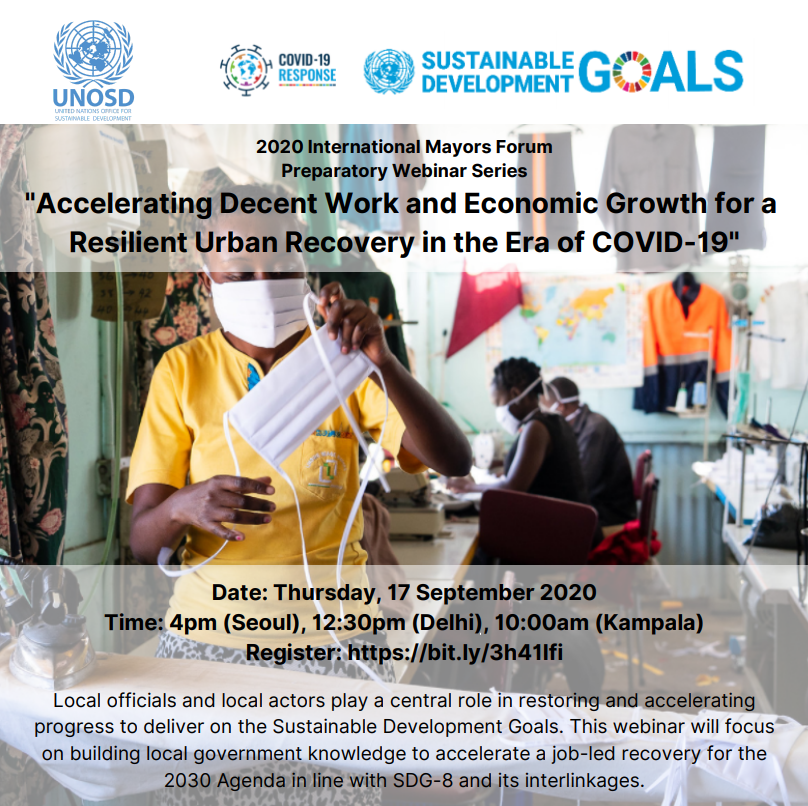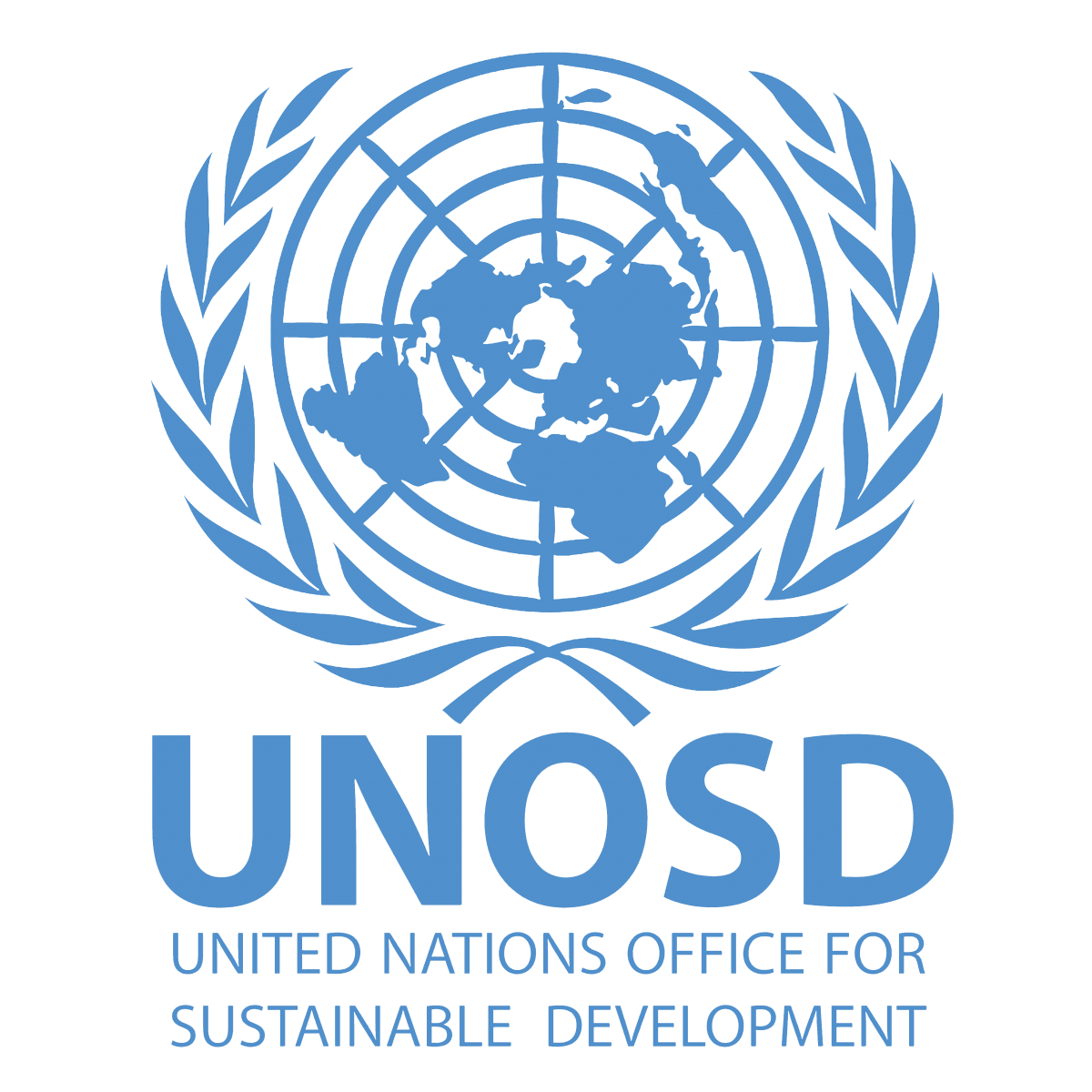[2020 International Mayors Forum Preparatory Webinar Series - Webinar #1] Accelerating Decent Work and Economic Growth for a Resilient Urban Recovery in the Era of COVID-19

Overview
Accelerating Decent Work and Economic Growth for a Resilient Urban Recovery in the Era of COVID-19
Recording of the Webinar
International Mayors Forum Preparartory Webinar Series - Webinar #1
Documents and Readings
CONCEPT NOTE (updated as of 8 September 2020)
SPEAKER BIOGRAPHY (updated as of 10 September 2020)
PARTICIPANT LIST (updated as of 10 November 2020)
Background
The current COVID-19 pandemic has greatly impacted the livelihoods and job stability of many cities worldwide, including both formal and informal business sectors. The United Nations has noted that job losses as a result of the COVID-19 pandemic are leaving up to half the global workforce – 1.6 billion people – without livelihoods and sixty million more people will be pushed into extreme poverty. The world is experiencing a loss of $8.5 trillion in global output – the sharpest contraction since the Great Depression of the 1930s. The Sustainable Development Goals, especially Goal 8, focus on promoting sustained, inclusive and sustainable economic growth and full and productive employment and decent work for all. While the pace of global economic growth was already slowing before the pandemic, its impacts on the global economic downturn are continuing.
Cities play a leading role in generating national employment, productivity and economic development, with over 80 per cent of GDP coming from cities. However, since the start of the COVID-19 pandemic, the International Labour Organization notes that that more than one in six young people have lost their jobs since the pandemic began and those that are still at work have seen their hours reduced. Today, the world’s youth population is 1.21 billion or over 15% of the global population, mostly located in urban centres. The UN Secretary-General has underscored that local governments are already taking action to protect local household incomes and access to essential services - from prohibiting evictions during the crisis to putting in place new clean water stations in the most vulnerable areas – but more must be done to strengthen the capacities of local governments.
Current urbanization trends are often accompanied by significant social and environmental challenges, such as the lack of access to adequate, affordable urban land and housing options, urban infrastructure and basic services for a growing number of citizens, who suffer from rising inequality and exclusion, unemployment, food insecurity and extreme poverty. This is particularly true in developing countries, where 95% of urban expansion will take place over the next decades and where the challenges of COVID-19’s socio-economic impacts are being felt most. It is also a matter of major concern that cities and urban areas in developing countries are already accommodating most of the 883 million people living in slums, many of whom are often working in the informal labor sector.
Local governments are currently facing a double challenge of restoring life as normal and accelerating growth, full and productive employment, and decent work for all. Local officials can play a central role in ensuring a swift and sustainable recovery to restore and accelerate progress in delivering the Sustainable Development Goals during the coming decade.
Organizers

This webinar is organized by the United Nations Office for Sustainable Development of the United Nations Department of Economic and Social Affairs
Objectives and Content
This webinar will explore the socio-economic impacts of the current crisis on cities and how local governments other local actors can work together and be supported towards a more inclusive resilient recovery and sustainable urban future.
Presentations and discussion will focus on solutions for local governments to accelerate sustained, inclusive and sustainable economic growth, full and productive employment and decent work for all to move from a decade of recovery to a decade of action for the 2030 Agenda.
Target Audience
This webinar aims to engage sub-national government representatives, local government leaders, and national institutions across the UN Member States. The webinar will also be open to non-government experts working in the areas of SDG implementation, decent work, local economic growth, employment policies and programmes, enterprise and entrepreneurship, and youth employment topics. The webinar will also be open to academia, youth, and other interested stakeholders to ensure an inclusive and integrated discussion on accelerated local solutions for the SDGs and the 2030 Agenda.
Opening/Moderator
- Mr. Jean D’Aragon, Officer in Charge, UN Office for Sustainable Development, UN DESA
Speakers
- Ms. Laurence Kwark, Secretary-General, Global Social Economy Forum (GSEF)
- Mr. Carlos Carrion-Crespo, Specialist, Public Services, International Labour Organization
- Ms. Najat Zarrouk, Director of the African Local Government Academy (ALGA) of UCLG-Africa
- Mr. Ilcheong Yi, Senior Research Coordinator, Social Dimensions of Sustainable Development Programme, UNRISD
For more information:
Sara Castro de Hallgren, UNOSD, UN DESA at sara.castrohallgren@un.org
Disclaimer:
For the purpose of this event, UNOSD procures the services of Cisco Webex, an external service provider. Registration for this webinar is supported by the Webex Events registration mechanism and does not imply the expression of any opinion whatsoever on the part of the Secretariat of the United Nations concerning the legal status of any country, territory, city or area or of its authorities

